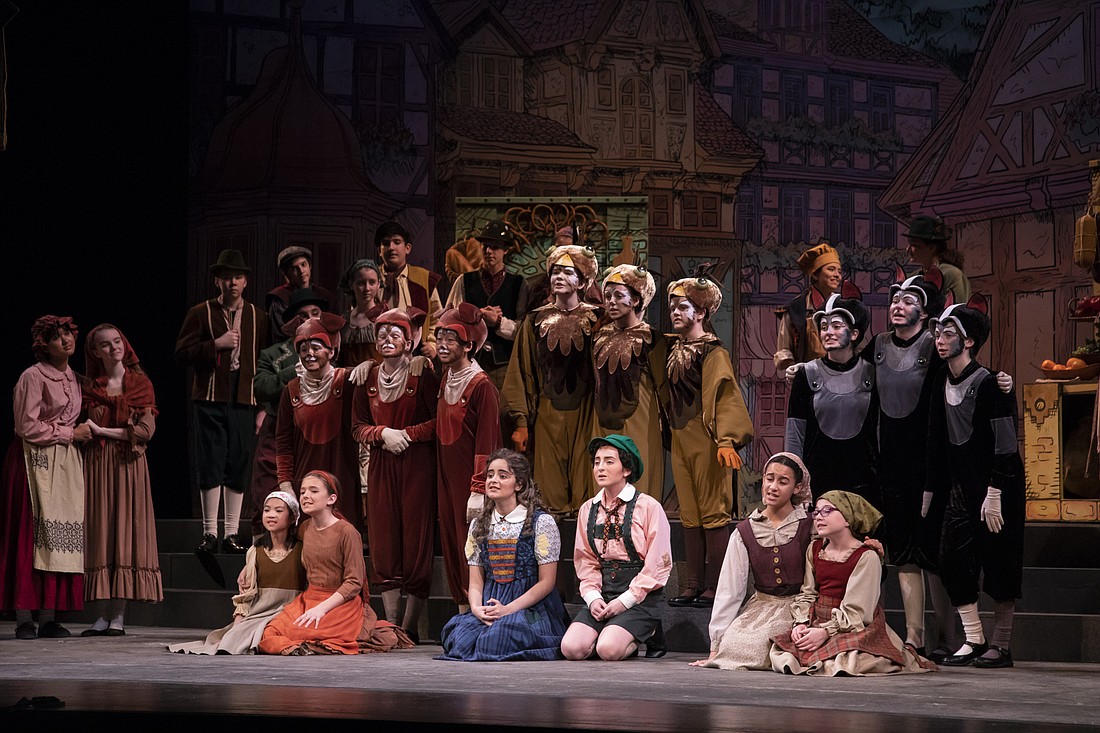- May 3, 2025
-
-
Loading

Loading

The Sarasota Youth Opera, now in its 35th year, is unique in having a proper main-stage production, with full sets, costumes, lighting and an orchestra in the pit. Last week’s production of Hans Krásna’s “Brundibár” brought forth a message and performance of mature values and meanings beyond the years of these young performers.
Although “Brundibár” was composed prior to World War II, it was given 55 performances by the children in the Thereseinstadt Jewish camp-ghetto also known as Terezin, which had its own cultural community. The straightforward plot is centered around two children who are seeking money to buy milk and bread for their ailing mother but are thwarted by Brundibár, a local mountebank organ grinder, until he is overcome by the townspeople and friendly animals. The children ultimately raise the money, and all ends happily.
Well and good, and I’ll get back to”Brundibár;” but for me the most moving part of the evening was the prologue, “Raise Up Your Voice: Intolerance Through the Voices of Children,” compiled and arranged by Music Director Jesse Martins and Stage Director Martha Collins.
This prologue consisted of lyrics ranging from “We hold these truths to be self evident” of the Declaration of Independence, to moving texts from the voices of children who experienced prejudice, racism and bigotry through the years. Much was set to the music of Antonín Dvorák, Giacomo Puccini, folk songs and spirituals. All these quotes, which came from the 1860s forward, included actual writings from children writing in the Terezin camp, Japanese Americans incarcerated during World War II, victims of racism in 1960s America and finally voices of the Youth Opera members themselves writing of current anti-LGBTQ and other prejudices in their own lives.
These were all strongly delivered in speech and song by the Youth Opera members to music arranged and conducted by Martins with members of the Sarasota Orchestra. The combined effort brought forth both feelings and content that conveyed the message of life under intolerance with a strength I haven’t felt in a very long time.
This strong message rang out: “When the whole world is silent, one voice becomes powerful.” Truly, in paraphrase, “Out of the mouths of the young come great truths,” or “The voices of children shall lead them.”
The sentiments were made even stronger by the inspired direction of Collins, who, using only a blank stage with wide stairs to a large platform, moved these 80 or 90 young performers into meaningful groupings that emphasized the lyrics and meanings of each of the musical selection. Ken Yunker’s fluid lighting highlighted each of the young speakers, which added to the weight of the message.
After an intermission in which the capacity audience was literally able to catch its breath, Martins and the orchestra performed Hans Krása’s "Overture for Small Orchestra," setting the stage for “Brundibár,” which transformed the stage and the mood of the evening.
Originally written in 1939 for a children’s opera competition, the music is straightforward and tuneful, a bit in the style of Kurt Julian Weill or others of that period, but it wasn’t performed until 1943.
All the roles were well sung and acted by these beautifully trained young singers.
Eden Stahlmann as Little Joe; Ana Olson as his sister, Annette; and Isabela Mendez as Brudibár, the organ-grinder villain, were equally good. Samuel Stahlmann’s Ice Cream Man, Ursula Kushner’s baker, Caelyn Curry’s milkman and Lan Hubbard’s police officer, sang well and made their characters believable without caricature. The menagerie of sparrows, cats and dogs all contributed to the ensemble and downfall of Brundibár.
I’ve written before that Collins is something of a miracle worker in her ingenuity and direction of the young singers in the Youth Opera. Throughout the evening, it seemed that each of the 80 or so young performers had a specific character and was an individual, not just one of the flock. This was even stronger in the opera with each villager in the chorus acting and reacting with his or her colleagues in a manner beyond their years.
Musically, the Youth Opera has progressed rapidly during Martins' tenure as the music director and conductor. The principal singers are discreetly amplified, so the young voices can sing and not shout, which increased the musicality of the entire evening. The chorus sings with clear diction, good phrasing and solid pitch, which made for a musically rewarding experience. The concluding chorus, "Stand Up and Shout With Glee,” had the audience doing exactly that.
It’s really unfortunate that circumstances and logistics are such that there are only two performances because the prologue and the opera provide a message with a big wallop, one that is as meaningful in today’s world as it was when it was first written.